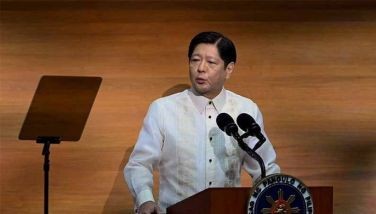Going digital

On June 2, 2023, President Marcos Jr. led the launch of eGovPH Super App, intended to make life easier for millions of Filipinos (and foreigners) with the digitalization of nearly all transactions with the government.
From now on, it will be easier for ordinary Filipinos to get a national ID, a driver’s license, a passport, a visa, a job, a contract and even a business permit, and to pay taxes, fines, penalties and any of the multitude of impositions by the lowest to the highest offices of government. People can report a crime. The police will solve it fast. That is the ambition.
Initially, 40, out of 455 government agencies, will join eGovPH.
“This is what e-governance is about, to bring it all together to make it simple and available, accessible,” enthused Marcos at the launch.
“Government must be able to identify and utilize high-impact innovations to improve its own governance and transform itself into an agile bureaucracy that is responsive to our people’s needs,” Marcos stressed.
The President told his listeners at the launch: “We are talking about the ease of doing business, the ease of interacting with the government. This is not something that is an option that we might want to examine. This is something we need to do.”
“All of these must come together in a way that is useful and easy and convenient for the ordinary Filipino citizen,” he stressed.
The President pointed out that 95 percent of digitalization is a private sector effort.
“Ano ‘yung 5 percent? Government. We cannot do it online with government. We have to go to the office. We have to collect the birth certificate, the documentation, the clearance and then we go to the government office and they say: ‘You’re missing one document’. Balik na naman. And they do all of these things,” Marcos related.
eGovPH means only one thing for the people, according to the President. Ease of doing work, and ease of doing business.
Have you ever dealt with the government?
Five years ago, I tried to secure a business permit, in Mandaluyong, the Tiger City. I was made to shuttle my application from one table to another, about five tables, each manned by a “chief.” This was a room of less than 40 sqm. So I asked the people manning the desks, in Tagalog: “Don’t you guys know each other? Why do I have to move from one table to another to have the same application signed or whatever?” No answer.
Then I asked the guy standing in front of me: “And why do you collect a tax on my capital?”
“It’s in the Internal Revenue Code!” he replied in accented English.
My reply: “I am opening a business, investing money and creating jobs. Why do I have to be taxed to do that?”
His reply, in English: “It’s in the Internal Revenue Code!”
I went out of the room, sat on the concrete stairs of the building. After 30 minutes, I got impatient and went back into the room. My papers were still being “processed.” So I dialed the then mayor Benhur Abalos. In two minutes, I got what looked like an aluminum car plate. My business permit.
Another vexation is having to get a fire inspection certificate before one can get a business permit. This is in San Juan City. So I asked the inspector: “Do you see the logic of my having to get a fire permit? You are, in effect, saying, I am putting up a business just to burn it.” Well, the inspector was frank enough. He told me to buy his fire extinguishers. “No,” I said, “tell me where I can buy fire extinguishers that are up to your standards.”
His reply: “Sa SM hardware sir, mas mura.”
With eGovPH, things should be better. There will be no human contact. Payment will probably be cashless. And seamless. Hopefully.
The Bangko Sentral is taking the digitalization lead. By the end of this year, BSP wants 50 percent banking transactions to be digital and that 70 percent of Filipinos will open a bank account.
Many banks do not recognize the national ID as a valid ID. It has no signature. And banks always want signatures.
Digitalization is the ultimate financial inclusion. With every one’s data reduced to just Is and Os, everyone will be on equal footing. In theory.
When it comes to the best in digital banking, Union Bank cannot be far behind. In fact, it has always been ahead of the curve. Union Bank has the distinction of having won the accolade Best Digital Bank three years in a row. But it is not resting on its laurels.
UB’s digital banking innovations and technology are powered by a single motive factor – no one gets left behind.
UB president and CEO Edwin Bautista explains what the slogan “no one gets left behind” in digital banking:
“No. 1, as the economy grows, those at the bottom of the pyramid also benefit economically; and No. 2, customers who are not ready for a digital world will continue to be supported and hand-held in their digital journey.”
For most customers and depositors of Union Bank, over 80 percent of their transactions are now digital.
Digital is the most inclusive tool ever deployed by the banking industry to engage those who have no bank accounts and to make life easier for those who already have bank accounts. As digitalization scales up, so is the cost of servicing.
The banks initially lose income because of the lowering of fees, but they make up for that in increased number of customers and in lower cost of handling transactions which have become cashless, paperless and seamless.
A recent study by Visa Philippines called “Consumer Payment Attitudes” shows most consumers, who already use traditional credit cards, are likely to try other contactless payment methods.
* * *
Email: [email protected]
- Latest
- Trending


























